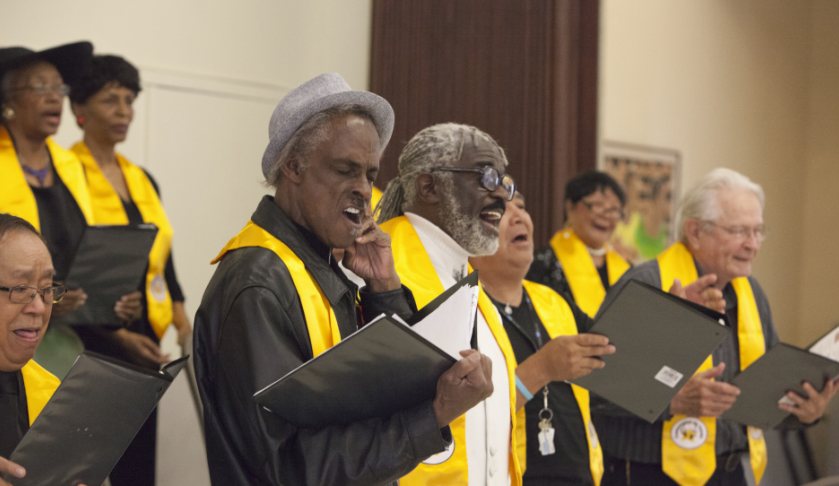
The San Francisco Community Music Center (SFCMC), in collaboration with UC San Francisco and the San Francisco Department of Aging and Adult Services, has completed the Community of Voices Trial. The study, funded by a five-year grant to UCSF from the National Institute on Aging of the National Institutes of Health, aimed to examine whether singing in a community choir is a cost-effective way to promote health and well-being among culturally diverse older adults. The results have now been released in the Journal of Gerontology: Psychological Sciences, as well as being shared publicly on the Community of Voices Website.
“We hear from our older adult choir members all the time how singing in the choirs lifts their spirits, but it’s wonderful to get this confirmation from a research study about the impact of singing in a choir for older adults. We are grateful to UCSF and Julene Johnson for their work on this,” comments Julie Rulyak Steinberg, executive director, Community Music Center.
The study followed twelve community choir groups made up of 390 socioeconomically and racial/ethnically diverse adults aged 60 and over. Led by professional choir directors and accompanists, choirs practiced and performed music that was culturally specific to each community and appropriate for older adults with varied singing and music-reading abilities. Researchers examined the physical, cognitive, and psychosocial impacts on choir members by measuring health and wellbeing outcomes including memory, cognition, feelings of loneliness, and interest in life.
Researchers found significant improvements in loneliness and an interest in life for older adults who sang in a choir for six months. There were no substantial differences in cognitive ability, physical outcomes, or health care costs. “We were a little surprised not to see improvements in cognitive and physical function, especially because the literature, although small, suggested there should be improvements,” said lead author Julene Johnson, PhD, associate dean for research and professor in the UCSF School of Nursing. “However, our study is one of the first randomized controlled trials of a choir intervention, whereas the others were cross-sectional or did not randomly assign the participants.” More research is needed on how choirs improve well-being and the potential long-term health impacts, said Johnson.
With an aging population and a lack of social systems to adequately support them, the risk for social isolation, depression, and loneliness is older adults is high. Community choirs represent one creative and accessible approach to engage older adults in the arts because they are low cost to deliver, engaging, and can be culturally tailored to each community.
You can read the full press release here, and access the Community of Voices Study Choir Program Manual here for a guide to creating a community choir for older adults.
Photo courtesy of Community of Voices Choir Program Manual
Published: January 18, 2019